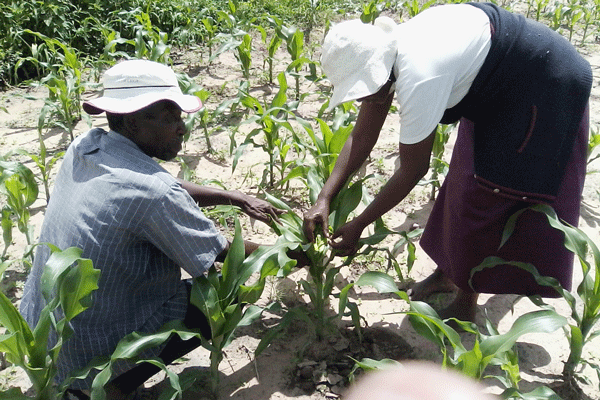
ZIMBABWE’S maize production for the 2017/18 agricultural season is forecast to fall far below last season’s figure of 2,15 million tonnes, due to the dry spell being experienced in the country, farmers and agricultural experts have said.
BY MTHANDAZO NYONI
The 2018 national budget had projected a maize output of 2,2 million tonnes this year.
Zimbabwe, especially the southern parts of the country, is currently experiencing a hot and dry spell which has resulted in crops wilting.
Farmers and agricultural experts last week told Standardbusiness that the crop situation in the country was very bad and worrying.
“The situation is bad, especially for those who are not irrigated. It’s very bad and most crops are at permanent wilting stage.
If it rains right now up to March, the situation might improve but we will never achieve what we achieved last season. We are riding on a thin line,” Federation of Farmers’ Union president Wonder Chabikwa, said.
Zimbabwe produced 2,15 million tonnes of maize last year, the highest yield in two decades, due to favourable weather conditions and a special programme for import substitution, commonly known as command agriculture.
- Chamisa under fire over US$120K donation
- Mavhunga puts DeMbare into Chibuku quarterfinals
- Pension funds bet on Cabora Bassa oilfields
- Councils defy govt fire tender directive
Keep Reading
Chabikwa, however, said in some regions, especially region 1 and some parts of region 2, the crop situation was better.
He urged farmers to keep their crops free from weeds.
“Let’s do our agronomic and husbandry practices while waiting for full rains,” said Chabikwa, who is also Zimbabwe Commercial Farmers’ Union president.
Commercial Farmers’ Union president, Ben Purcell Gilpin said due to a shortage of rainfall, the country was likely to have a maize deficit this season.
“The state of the crops at the moment is very worrying. It’s been a long dry period. In fact, we would be looking for the shortfall in terms of production this year,” Gilpin said.
He, however, said there were areas in the country that still had good crops.
Matabeleland North provincial crop and livestock officer, Dumisani Nyoni said crops in the region were wilting.
He said if rains could come this week, “those crops that are in temporary wilting might survive but those in permanent wilting will not survive.”
Some of the districts found in the province include Victoria Falls, Bubi, Hwange, Umguza, Tsholotsho, Nkayi, Binga and Lupane.
Matabeleland South crop and livestock officer, Simangaliphi Ngwabi, said the crop situation in the province was very bad.
“The situation is very bad. Last week I toured all my districts, assessing the situation and I found out that all was not well. Crops have wilted. If we don’t get rains this week, all crops will be a write-off,” she said.
Districts falling under Matabeleland South province include Beitbridge, Bulilima, Gwanda, Insiza, Mangwe, Matobo and Umzingwane.
Meteorological Department Matabeleland South provincial officer, Rodgers Hugh Munyira, said the situation for Matabeleland South region looked gloomy.
“The entire southern region hasn’t had good rainfall as anticipated in the forecast. The inter-tropical convergence zone is not pregnant with rain as usual. The situation looks gloomy and pathetic,” Munyira said.
The Meteorological Services Department recently advised farmers in the southern parts of the country to start irrigating their crops due to the shortage of rain.
It said while most areas showed mostly normal rainfall to date, the season had performed badly in terms of rainfall distribution.
Government has, however, urged people not to panic about the prevailing dry spell saying the nation had sufficient grain reserves to take the country through to the next farming season.
Recently, President Emmerson Mnangagwa said last year the country produced in excess of two million tonnes of maize following the “successful” implementation of command agriculture.
He said the country had adequate stocks of grain in its strategic grain reserves to sustain the nation up to 2019. Besides maize, one of the country’s largest foreign currency earners, tobacco, is also under threat due to the dry spell.
A recent media visit to Mashonaland West revealed the dire situation, with farmers pessimistic about production prospects this season. Indications on the ground show that the possibility of farmers recording heavy losses this season is high.
Persistent hot, dry weather patterns stunt plant growth and produce shorter tobacco leaf length and a dry natured tobacco, which does not sell.
In its January update, the Famine Early Warning Systems Network (Fewsnet) said the “abnormal dryness had resulted in severe moisture stress for most crops”.
“In parts of the southern and northern regions some farmers are close to completely writing-off the season. There has been little ground water recharge and surface water collection in most areas, resulting in poor water availability and access. The poor rainfall performance is also expected to affect the availability of seasonal green crops for consumption, as well as on-farm casual labour opportunities, rates, and other livelihood sources,” Fewsnet said.
“The high likelihood of below-average rains for the remainder of the season is likely to significantly reduce crop yields and harvests across most parts of the country.”
Lands, Agriculture and Rural Resettlement deputy minister, David Marapira told Standardbusiness that the ministry usually sent out a team to do crop assessment in March.
“We usually send our team to conduct crop assessment in March. Right now, I may not be in a position to give you accurate information on the crop situation in the country, he said.
He refused to divulge how much was deployed under the command agriculture programme, referring all the questions to Vice-President Constantino Chiwenga, who is the programme chairman.











